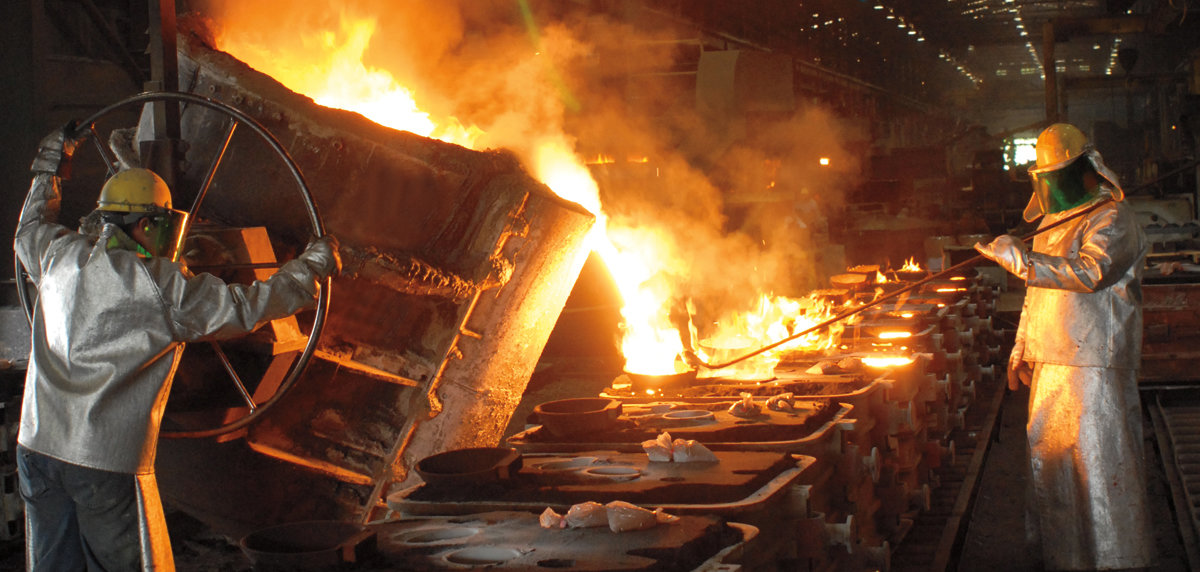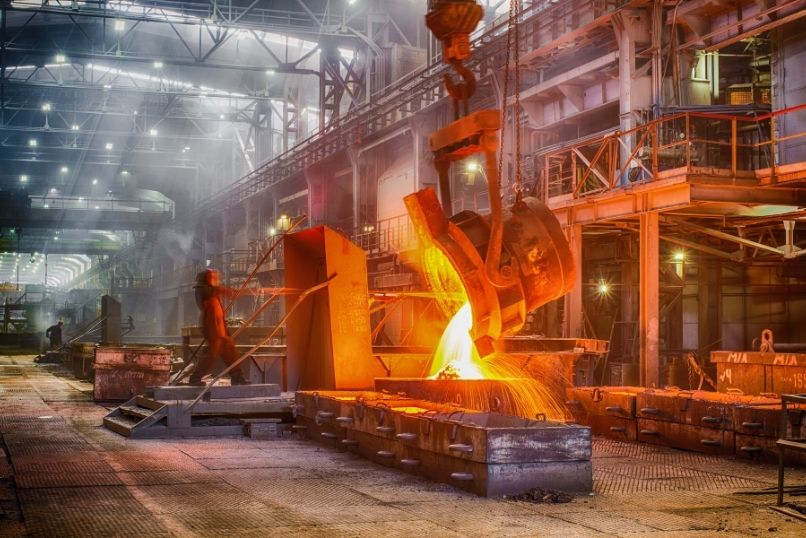Unveiling the Role of Metal Foundry in Construction Manufacturing
Wiki Article
A Comprehensive Guide to Metal Casting: Benefits and Solutions Used by Foundries
Metal casting is an essential procedure in numerous industries, offering countless advantages with the services of factories. These centers transform molten metal right into exact and durable components, catering to particular customer needs. By utilizing innovative modern technologies, factories guarantee quality and effectiveness in production. The intricacies of metal casting and the diverse strategies involved elevate vital questions regarding its role in modern-day production. What advancements exist ahead in this crucial field?Understanding the Metal Casting Process
The metal casting process is an essential technique utilized in manufacturing to produce complicated shapes and parts. This technique entails pouring liquified metal right into a mold developed to create the wanted object. The process starts with pattern production, which acts as a layout for the mold. Aluminum Foundry. Numerous products, such as sand, metal, or ceramic, are utilized for mold-making, relying on the specific needs of the casting
When the mold and mildew is ready, liquified metal is put right into it and permitted to strengthen and cool. After solidification, the mold is removed, exposing the cast part. Various methods, consisting of sand casting, financial investment casting, and die casting, are used, each matched to different applications and materials. Quality assurance measures, such as inspections and screening, are necessary to guarantee the end product fulfills specs. Overall, the metal casting process plays an essential duty in producing parts for markets varying from automotive to aerospace.
Key Benefits of Metal Casting
Metal casting offers significant advantages that make it a recommended manufacturing method in numerous sectors. Its layout flexibility and accuracy enable intricate forms, while cost-efficient automation boosts efficiency. In addition, the convenience and strength of products utilized in casting add to the durability of the final items.Style Adaptability and Accuracy
Releasing impressive layout versatility and accuracy, metal casting allows designers and designers to create intricate shapes and attributes that would certainly be difficult or difficult to attain with various other producing methods. This ability enables the manufacturing of complicated geometries, interior structures, and great information that improve product functionality and visual appeals. Furthermore, various casting methods, such as sand casting, financial investment casting, and die casting, offer more options for customization, accommodating diverse material residential or commercial properties and project demands. The flexibility of molds permits alterations throughout the style stage, simplifying the shift from idea to end product. Inevitably, metal casting stands out for its capacity to provide high-precision parts, making it a vital procedure in sectors ranging from automotive to aerospace and beyond.Cost-efficient Mass Production
Cost-efficient automation stands as one of the primary advantages of metal casting, allowing producers to generate huge amounts of parts at a reduced cost each. This efficiency occurs from the ability to develop elaborate molds that can be recycled multiple times, significantly minimizing configuration and functional costs. Furthermore, metal casting procedures, such as sand casting and die casting, permit high throughput, making it viable to fulfill the needs of large-scale manufacturing runs. The lowered material waste and energy intake additionally improve cost savings, making metal casting an attractive choice for industries needing bulk parts. On the whole, the economical nature of metal casting positions it as a recommended technique for manufacturers intending for economic efficiency in their production processes.Material Flexibility and Strength
Among the standout characteristics of metal casting is its exceptional product adaptability, which permits the use of a variety of metals and alloys. This versatility allows producers to pick products that ideal suit their details applications, from aluminum and bronze to iron and steel. Each metal supplies distinct buildings, consisting of varying levels of toughness, corrosion resistance, and thermal conductivity. Metal casting can produce elements that meet strict performance demands throughout diverse sectors, such as automobile, aerospace, and building. Furthermore, the strength of cast metals can be enhanced through various treatment procedures, making certain sturdiness and durability. Aluminum Foundry. In general, the combination of product convenience and integral toughness makes metal casting a preferred option for producing top notch partsTypes of Metal Casting Techniques
Metal casting includes a variety of strategies that accommodate various production requirements and product buildings. Typical techniques include sand casting, which makes use of a sand mold and mildew for complicated forms, and financial investment casting, understood for its precision and surface area finish. Die casting is one more technique that utilizes high-pressure injection of liquified metal right into molds, suitable for automation of tiny parts.Shell molding uses a faster different, using a resin-coated sand to produce thin-walled mold and mildews, while shed foam casting permits elaborate layouts without the need for a core.
Additionally, constant casting is utilized for creating long sections of metal, such as bars or sheets, by strengthening liquified metal in a continuous process. Each technique provides one-of-a-kind advantages and is selected based on aspects like the required detail, manufacturing quantity, and material kind, making sure superior outcomes in metal construction across numerous markets.
The Role of Foundries in Metal Casting
Factories play an essential function in the metal casting procedure, working as the facilities where molten metal is great post to read changed into ended up items. These specialized facilities are outfitted with the necessary tools and modern technologies to manage different steels, making certain high-grade end results. Shops are accountable for numerous important functions, consisting of thawing the metal, putting it right into mold and mildews, and enabling it to solidify.Additionally, they keep strict security and ecological criteria to secure workers and minimize environmental effect. Knowledgeable professionals and designers collaborate to enhance casting processes, enhancing effectiveness and reducing waste. Factories also participate in high quality control actions, ensuring that the last products satisfy specific tolerances and requirements. This quality assurance is essential for sectors that count on specific elements, such as auto and aerospace. Because of this, factories add significantly to the general production landscape, allowing development and development throughout various fields.
Custom-made Metal Casting Services
Personalized metal casting services use customized style services that satisfy details client needs. These solutions also provide material choice know-how, making sure the appropriate metal is selected for the desired application. Such versatility and understanding boost the general top quality and performance of the last product.
Customized Style Solutions
Customized layout solutions in metal casting offer manufacturers with the adaptability to produce parts that satisfy particular efficiency and aesthetic needs. Factories provide personalized services that permit clients to define measurements, shapes, and surface finishes to attain wanted outcomes. This personalization process typically consists of partnership between designers and designers, ensuring that the end products straighten with operational requirements and sector requirements. Advanced innovations, such as weblink computer-aided layout (CAD) and simulation software, enable precise modeling and testing of components before manufacturing, enhancing and minimizing errors effectiveness. By leveraging customized design remedies, businesses can optimize capability while decreasing waste and prices, inevitably bring about an extra affordable edge on the market. This adaptability is important for industries calling for special applications and specifications.Material Option Expertise
When picking products for metal casting, know-how plays an important role in making certain that the right choice lines up with both efficiency needs and cost-effectiveness. Shops employ competent specialists that comprehend the residential or commercial properties of various steels and alloys, allowing them to recommend perfect materials for certain applications. Variables such as strength, corrosion resistance, and thermal conductivity are very carefully thought about to meet the client's needs. In addition, industry patterns and developments in material science inform these decisions, enabling foundries to remain affordable. By leveraging their knowledge, shops can aid customers in steering through facility product options, ultimately resulting in improved item quality and lowered manufacturing costs. This customized understanding is vital for achieving successful outcomes in personalized metal casting solutions.Top Quality Control in Metal Casting
Quality assurance in metal casting is vital to guarantee that the final products meet the called for specifications and efficiency criteria. Foundries use a range of techniques and techniques to assure the best quality of actors parts. This process starts with stringent material assessments, verifying that raw products abide by sector standards. Throughout the casting process, real-time monitoring and screening are performed to analyze specifications such as temperature, mold and mildew stability, and dimensional accuracy.
Applications of Metal Castings Across Industries
Metal spreadings play a vital function in numerous sectors, acting as the backbone for countless applications. In the automobile field, cast parts such as engine blocks and transmission housings are necessary for vehicle efficiency and dependability. The aerospace sector counts on precision spreadings for critical parts that guarantee security and effectiveness in flight. Furthermore, the building sector utilizes metal castings for fixtures, fittings, and structural elements, enhancing the sturdiness of buildings and framework.The power industry advantages from castings used in wind turbine blades and other tools crucial for power generation. The medical field additionally utilizes metal castings in gadgets and tools, demonstrating the versatility of this production procedure. On the whole, metal spreadings are indispensable to the performance and improvement of varied fields, showcasing their value in modern-day technology and infrastructure advancement
Regularly Asked Questions
What Products Are Frequently Used in Metal Casting?
Common products used in metal casting include aluminum, iron, bronze, steel, and brass. Each product offers distinct buildings ideal for numerous applications, enabling manufacturers to choose the most effective option based on strength, corrosion, and weight resistance.For how long Does the Metal Casting Process Commonly Take?
The metal casting procedure generally takes numerous hours to a couple of days, depending upon variables such as the intricacy of the layout, sort of metal made use of, and the specific casting technique employed by the factory.
What Is the Ecological Impact of Metal Casting?
The ecological impact of metal casting includes energy consumption, exhausts, and waste generation. Factories often execute steps to minimize these results, such as recycling products and utilizing cleaner technologies to lower their environmental impact.Can Metal Casting Be Provided For Small-Scale Projects?
Metal casting navigate to this site can without a doubt be performed for small-scale projects. Various factories satisfy such needs, offering personalized solutions that accommodate minimal manufacturing runs while maintaining top quality and precision in the end products.What Are the Precaution in Metal Casting Foundries?
In metal casting factories, precaution include personal safety tools, correct air flow, training on tools usage, emergency procedures, routine upkeep checks, and adherence to sector security standards to reduce risks connected with liquified metal and hazardous materials.Furthermore, metal casting procedures, such as sand casting and pass away casting, allow for high throughput, making it possible to satisfy the needs of massive production runs. One of the standout characteristics of metal casting is its amazing material flexibility, which allows for the use of a vast variety of alloys and metals. Furthermore, continuous casting is made use of for generating lengthy areas of metal, such as bars or sheets, by solidifying liquified metal in a continual process. Shops play a critical function in the metal casting procedure, offering as the facilities where molten metal is transformed into finished products. Common materials utilized in metal casting include aluminum, iron, bronze, steel, and brass.
Report this wiki page